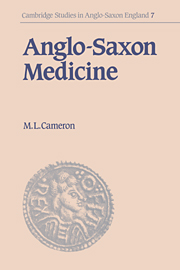Book contents
- Frontmatter
- Contents
- Preface
- Acknowledgements
- List of abbreviations
- 1 Introduction
- 2 Conditions for health and disease
- 3 Physician and patient
- 4 The earliest notices of Anglo-Saxon medical practice
- 5 Medical texts of the Anglo-Saxons
- 6 Compilations in Old English
- 7 Compilations in Latin
- 8 Latin works translated into Old English: Herbarium and Peri Didaxeon
- 9 Sources for Old English texts
- 10 Making a Leechbook
- 11 Materia medica
- 12 Rational medicine
- 13 Magical medicine
- 14 The humours and bloodletting
- 15 Surgery
- 16 Gynaecology and obstetrics
- 17 Conclusions
- Appendix 1 Quotations for ch. 10
- Appendix 2 Quotations for ch. 13
- Appendix 3 Quotations for ch. 14
- Appendix 4 Quotation for ch. 15
- Bibliography
- Index
7 - Compilations in Latin
Published online by Cambridge University Press: 30 September 2009
- Frontmatter
- Contents
- Preface
- Acknowledgements
- List of abbreviations
- 1 Introduction
- 2 Conditions for health and disease
- 3 Physician and patient
- 4 The earliest notices of Anglo-Saxon medical practice
- 5 Medical texts of the Anglo-Saxons
- 6 Compilations in Old English
- 7 Compilations in Latin
- 8 Latin works translated into Old English: Herbarium and Peri Didaxeon
- 9 Sources for Old English texts
- 10 Making a Leechbook
- 11 Materia medica
- 12 Rational medicine
- 13 Magical medicine
- 14 The humours and bloodletting
- 15 Surgery
- 16 Gynaecology and obstetrics
- 17 Conclusions
- Appendix 1 Quotations for ch. 10
- Appendix 2 Quotations for ch. 13
- Appendix 3 Quotations for ch. 14
- Appendix 4 Quotation for ch. 15
- Bibliography
- Index
Summary
If you wish to be an accomplished physician,
always be cautious and you will not be at fault.
Some medical ideas and theories common to the Mediterranean world, such as that of the four humours and the practice of bloodletting to keep them in balance, or the role of dieting in preserving and restoring health, although practised assiduously by the Greeks and Romans and their followers, do not seem to have received as much attention from the Anglo-Saxons. But that they were acquainted with these theories and practices is clear from medical collections in Latin made by the Anglo-Saxons. We will find it useful to examine these to find out what an Anglo-Saxon physician might be expected to know about the best-established theories of disease and treatment in medieval Europe.
Medical collections in Latin of undoubted Anglo-Saxon compilation are obviously not as easy to identify as Old English ones, but at least two such survive in fairly late manuscripts, one in the Canterbury Classbook (CUL, Gg. 5. 35) and the other in the Ramsey Scientific Compendium (Oxford, St John's College 17), both of about 1100. There are other smaller texts, mostly of the kind Cockayne called ‘flyleaf leechdoms’. All these give a picture of medical lore of Mediterranean origin available to the Anglo-Saxons independently of the Leechbooks and Lacnunga. They show that Englishmen were acquainted with most of the minor works which circulated freely, usually pseudonymously or anonymously, through the whole of the Middle Ages. A summary of their contents shows that they were often of dubious medical value.
- Type
- Chapter
- Information
- Anglo-Saxon Medicine , pp. 48 - 58Publisher: Cambridge University PressPrint publication year: 1993



